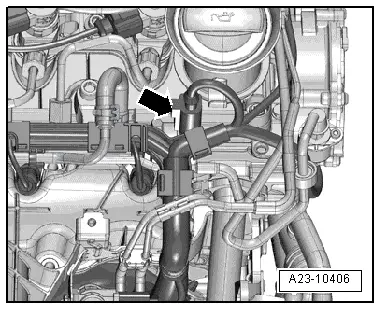| Regulations concerning safety precautions when working on the fuel system |

WARNING | When undertaking all assembly work, particularly in the engine compartment due to its cramped construction, please observe the following: |
| t
| Lay lines of all kinds in such a way that the original line guide is re-established. |
| t
| Ensure that there is adequate free access to all moving or hot components. |
| t
| The fuel or the fuel lines in the fuel system can become very hot (risk of burning)! |
| t
| The fuel system is under pressure! |
| t
| Wear safety goggles and safety clothing, in order to avoid injuries and skin contact with fuel. |
| t
| Place cleaning cloths around the connection point before detaching cable connections. Reduce pressure by carefully removing the wiring. |
| For reasons of safety the current supply to the fuel pump must be interrupted before opening the fuel system. Otherwise the fuel pump is activated when opening the driver's door. One of the following options must be used to interrupt the current supply: |
| Take out fuse for fuel pump relay -J17- |
| Disconnect the plug on the flange of the fuel delivery unit |
|

Caution | In order to avoid the high pressure pump to run dry and to achieve a quick engine start after parts are replaced, the following points must be observed. |
| t
| If parts of the fuel system were removed or replaced, it is necessary to initiate the basic setting „test of fuel pump for predelivery“ in order to vent the fuel system → Vehicle diagnostic tester. |
| t
| If a fuel pump, fuel line or the fuel filter is removed or replaced, the basic setting „test of fuel pump for predelivery“ must be carried out »once« before the first engine start. |
| t
| If the fuel pump was removed, the basic setting „test of fuel pump for predelivery“ must be initiated »3 times« before the first engine start. |
| t
| If the high pressure pump was replaced, the high pressure-pump must be filled with fuel before the first engine start → Chapter. |
|
| When removing and installing the fuel gauge sender or the fuel delivery unit from a full or partly filled fuel tank, pay attention to the following points: |
| t
| The extraction hose of an exhaust extraction system which is switched on, must be positioned close to the assembly opening of the fuel tank in order to extract the released fuel vapours, even before the work is commenced. If no exhaust extraction system is available, a radial fan (motor not in air flow of fan) with a delivery volume of more than 15 m3/h must be used. |
| t
| Avoid skin contact with fuel! Wear fuel-resistant gloves! |
| If test and measuring devices are required during test drives observe the following: |
| t
| Always secure the test and measuring devices on the rear seat and have a second person operate them there. |
| If the test and measuring devices are operated from the passenger seat, the passenger could be injured by the release of the passenger airbag in the event of an accident. |

WARNING | Secure the diagnostic device to the rear seat and operate from that position. |
|
| Observe the following points to prevent injury to persons and/or damage to the injection and preheating system: |
| t
| People, who have a heart pacemaker implant, should not bend over the engine compartment when the engine is running, as the injection units (solenoid valve injectors) generate an output high voltage pulse. |
| t
| No fuel lines must be opened when the engine is running. |
| t
| Disconnect and connect wires of the preheating and injection system as well as measuring device wires when the ignition is switched off. |
| t
| Do not carry out engine wash unless the ignition is switched off. |
|
|
|

